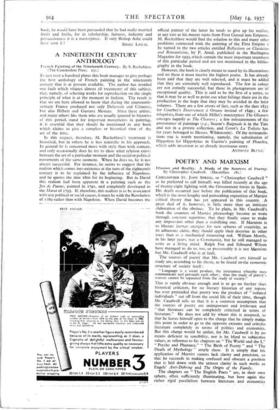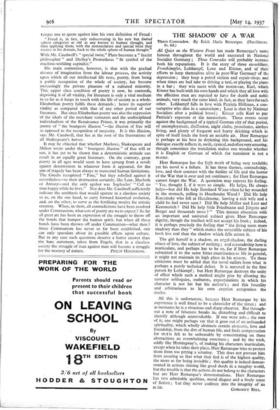Illusion and Reality. A Study of the Sources of Poetry.
By Christopher Caudwell. (Macmillan. 18s.)
POETRY AND MARXISM
CHRISTOPHER ST. JOHN SPRIGG, or " Christopher Caudwell "
as he preferred to call himself, was killed recently at the age of twenty-eight fighting with the Government forces in Spain.
His death occurred just before the publication of this book,
which is the most lengthy and painstaking exposition of Marxist critical theory that has yet appeared in this country. . A great deal of it, however, is little more than an intricate elaboration of the obvious. To be plain, in Mr. Caudwell's book the counters of Marxist phraseology become so worn through constant repetition that they finally cease to make any impression other than a stultifying one. If Marxism is to liberate human energies for new spheres of creativity, as its adherents claim, they should apply their doctrine in other ways than as a mechanical measuring rod. William Morris,
in his later years, was a Communist, but he still managed to write as a living mind. Ralph Fox and Edmund Wilson have managed to do so, too, so presumably it is not Marxism but Mr. Caudwell who is at fault.
The sources of poetry that Mr. Caudwell sets himself to study are, according to his thesis, to be found ins the economic structure of society itself :
" Language is a social product, the instrument whereby men communicate and persuade each other ; thus the study of poetry's sources cannot be separated from the study of society."
This is surely obvious enough and is to go no further than historical criticism, for no literary historian of any repute has ever pretended that poetry was the product of " isolated individuals " cut off from the social life of their time, though Mr. Caudwell tells us that it is a common assumption that the sources of poetry are unimportant and irrelevant and " that literature can be completely criticised in terms of literature." He does not add by whom this is assumed, so that he leaves himself open to the charge that he simply makgs this point in order to go to the opposite extreme and criticise literature completely in terms of politics and economics.
But this charge would be unfair, for Mr. Caudwell is by no
means deficient in sensibility, nor is he blind to subjective values, as reference to his chapters on " The World and the I," " Psyche and Phantasy," " The Birth of Poetry " and " The Death of Mythology " amply show. It is simply that his application of Marxist canons lack clarity and precision, so that he succeeds in making confused and obscure a position that is laid down with the utmost clarity in such works as Engels' Anti-Diihring and The Origin of the Family.
The chapters on " The English Poets " are, in their own sphere, often sufficiently illuminating, but here again the rather rigid ' parallelism between literature and economics tempts one to quote against him his own definition of Freud :
" Freud is, in fact, only rediscovering in his new but limited sphere categories as old as any known to human thought, 'and then applying them, with the nomenclature and special twist they receive in his domain, back to the whole sphere of human thought.'
With Mr. Caudwell's " special twist," Plato becomes a " fascist philosopher " and Shelley's Prometheus " fit symbol of the machine-wielding capitalist."
His main contention, however, is that with the gradual divorce of imagination from the labour process, the activity upon which all our intellectual life rests, poetry, from being a public occupation of the whole of society, has become increasingly the private pleasure of a cultured minority. This upper class condition of poetry is now, he contends, depriving it of all vitality, for literature is only a vital medium in so far as it keeps in touch with the life of society as a whole.
Elizabethan poetry fulfils these demands ; hence its superior vitality as compared with that of any other period of our literature. But since Elizabethan poetry was also the expression of the ideals of the merchant venturers and the undisciplined individualism of the Renaissance Prince, it was primarily the poetry of " the bourgeois illusion "—the illusion of free will as opposed to the recognition of necessity. It is this illusion, says Mr. Caudwell, that lies at the root of the frustrations of all Shakespeare's heroes.
It may be objected that whether Marlowe, Shakespeare and Milton wrote under the " bourgeois illusion " of free will or not, it has yet to be shown that a deterministic attitude can result in an equally great literature. On the contrary, great poetry in all ages would seem to have sprung from a revolt against determinism in whatever form it appeared, for the aim of tragedy has been always to transcend human limitations.
The Greeks recognised " Fate," but they rebelled against it nevertheless—to their destruction certainly, like Lear, Macbeth or Antony—and the only upshot was Sophocles' " Call no man happy while he lives." Nor does Mr. Caudwell sufficiently indicate the antithesis that would operate in a classless society so as, on the one hand, to carry forward historical evolution, and, on the other, to serve as the fertilising motive for artistic creation. When, in short, all contradictions have been resolved under Communism, what sort of poetry are we to expect ? So far all great art has been an expression of the struggle to throw off the bonds that hamper the human spirit, but when all these bonds have been thrown off under Communism—what then ? Since Communism has never so far been established, one can only speculate about its possible effects upon culture. But in any case such questions deserve a better answer than the bare statement, taken from Engels, that in a classless society the struggle of man against man will become a struggle















































 Previous page
Previous page